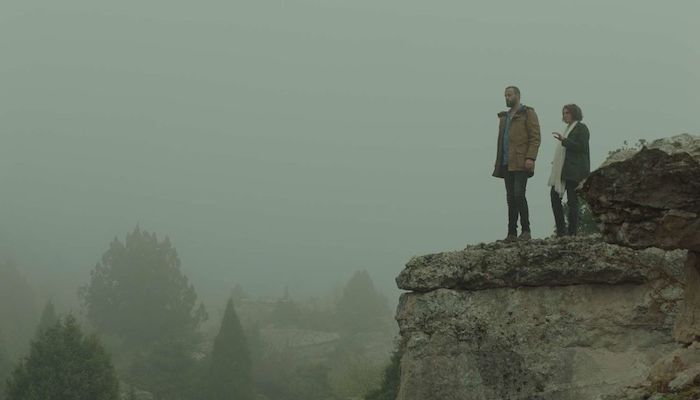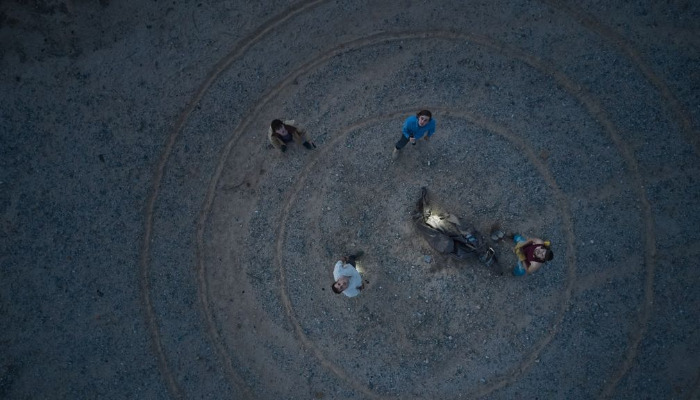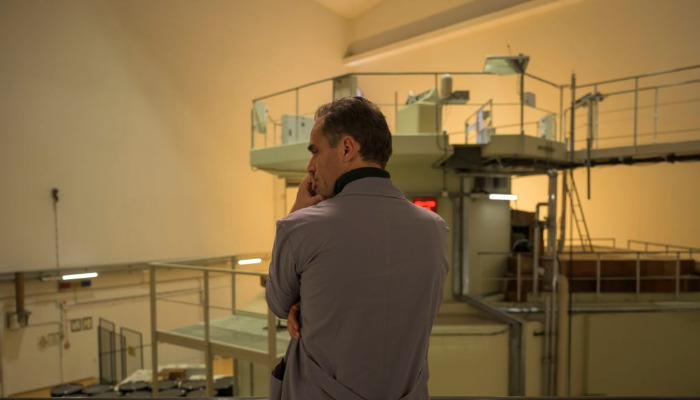Film Review: AL NAHER: A Sparse Emotional Thriller Awash in Allegory [Locarno 2021]
Al Naher Review
Al Naher (2021) Film Review from the 74th Annual Locarno Film Festival, a movie written and directed by Ghassan Salhab, starring Yumna Marwan and Ali Suliman.
Amidst the rural Lebanese landscape, a woman and a man (Yumna Marwan and Ali Suliman) are suddenly left alone. The restaurant staff at the café where they were somberly having a meal suddenly disappear, and the electricity flickers off. Cell reception has vanished, too, leaving the couple fully isolated from the rest of the world. Strange weather events occur in sequence: dark clouds quickly shroud the café’s patio only to disappear just as fast; violent gusts of wind blow about and then rapidly die down; thick onsets of mist rise and then dissipate. And then there’s the unmarked fighter jets soaring overhead, sometimes in coordinated fashion and sometimes not, with intermittent sonic booms and thin vapor trails crisscrossing the sky.
Rather than attempt to leave the café and get back on the road, the couple are drawn further into the woods surrounding them, curious as to what lies beyond. While they can never shake the feeling that someone (or something) is watching them, they use this period of undisrupted isolation to their advantage … to be intimate, to be vulnerable, and to lay out all the emotional clutter between them.
Salhab says that Al Naher (Arabic for “The River”) is the final entry in a triptych (most likely with his other geographically-titled films Al Jabal [“The Mountain”] and Al Wadi [“The Valley”] from 2010 and 2014, respectively) about “a constant threat that affects all of us and which in Lebanon has been present too long”. Framing it as an art-house dystopian tale and/or an emotional thriller, Al Naher distills these feelings of isolation and fear of the unknown through the metaphor of a personal relationship.
Marwan and Suliman’s characters backtrack their collective missteps as they attempt to navigate a portending sense of the unknown. Sometimes there is beauty and a sense of peace within their memories (captured on cellphone video, to conveniently preserve a fleeting moment for all time), and sometimes there are echoes of trauma (abandoned weapons casing with Hebrew print on them, which may recall the various military conflicts Lebanon has experienced with Israel).
But even those readings can feel like gratuitous stretches, as Salhab presents this set-up to us in extraordinarily vague fashion. Some of his metaphors seem pretty obvious – the titular “river” being the unrepenting, constantly-moving force of time; the couple’s isolation representing the niche-ness of romance (a self-imposed solitude that makes it hard to relate it to others who aren’t in the turmoil of it themselves). Others, however – from the obvious Biblical reading (a sort of return to Eden, as if placing the book of Genesis in reverse) to the unpredictable potential for violence (halfway through the film one of the characters suddenly produces a handgun, seemingly out of nowhere) – don’t quite mesh with the grand, overarching narrative.
Yet that’s exactly the issue: there really isn’t any grand, overarching narrative, because Salhab can’t decide on a central idea. Everything in Al Naher, though thematically intriguing and ripe for dissection, is ultimately directionless. The film bursts out in various directions without coagulating together around its central core, and that makes it hard to unquestionably go along with it.
Al Naher is beautiful and alluring at times, thanks to Bassem Fayad’s sturdy camerawork and Sharif Sehnaoui’s haunting bits of score, but at only 101 minutes it still manages to be incredibly drawn out. Marwan and Suliman are committed to their allegorical performances, but again, that’s exactly why the film feels weightless. It’s just allegory on top of allegory on top of allegory, which makes for nothing but a smokescreen of symbolism to hide its lacks of substance (further symbolized, of course, through the prominent appearance of fog, as if Salhab doesn’t trust you to understand the metaphor of psychological confusion and ephemerality on your own).
Ultimately, Al Naher is a somber peculiarity that may offer revelations to those patient or historically attuned enough to wait it out. For those wanting a bit more thematic orientation, though, you’d be better off not straying into this prickly brush.
Rating: 5/10
Leave your thoughts on this Al Naher review and the film below in the comments section. Readers seeking to support this type of content can visit our Patreon Page and become one of FilmBook’s patrons. Readers seeking more Fantasia International Film Festival news can visit our Locarno Film Festival Page, our Film Festival Page, and our Film Festival Facebook Page. Readers seeking more film reviews can visit our Movie Review Page, our Movie Review Twitter Page, and our Movie Review Facebook Page. Want up-to-the-minute notifications? FilmBook staff members publish articles by Email, Twitter, Facebook, Instagram, Tumblr, Pinterest, Reddit, and Flipboard.
Related Articles
FilmBook's Newsletter
Subscribe to FilmBook’s Daily Newsletter for the latest news!













